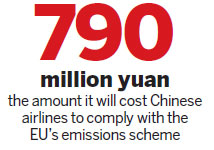Airlines reiterate opposition to EU's emissions scheme
Updated: 2012-06-12 08:27
By Wang Wen and Wang Zhuoqiong (China Daily)
|
|||||||||||
Chinese airlines have underlined their opposition of the European Union's Emissions Trading Scheme, at the 68th IATA Annual General Meeting, currently being held in Beijing.
Wang Changshun, chairman of Air China Ltd, said on Monday that Air China will continue to follow the government's policy of fighting the emissions-trading scheme.
"Air China will not participate in the EU's emission scheme," Wang said.
According to industry estimates, following the ETS standards will cost China's aviation industry 790 million yuan ($124 million) this year and an estimated 3.7 billion yuan in 2020, said Wang.
"The scheme will result in growing costs for air carriers and these costs will be transferred to passengers," he said.
He said the government and airlines always pay attention to cutting carbon emissions, and there are several ways other than levying a tax.
Liu Shaoyong, president and chairman of China Eastern Airlines, insisted his carrier also remained in line with the government's stance.
The Civil Aviation Administration of China independently issued an order in February forbidding Chinese airlines from abiding by the ETS.

Eight Chinese airlines, along with two of their Indian counterparts, are still to submit any carbon emission data from last year to the EU, whereas 1,200 carriers across the world are reported to have already handed over details, EU Commissioner for Climate Action Connie Hedegaard said on May 16.
The EU has said it will impose penalties on airlines if they do not report the data by mid-June and they could face fines or even be banned from flying to Europe, according to industry insiders.
However, the Chinese airlines have received support from within the international industry.
"I think it's a good thing that China's response to the ETS has been strong, mandating its carriers not to be a part (of the scheme)," said Tony Tyler, CEO of the International Air Transport Association.
IATA has also reiterated its call for a comprehensive global solution on aviation emissions to be negotiated through the International Civil Aviation Organization.
The international air transport industry is committed to three goals to manage its estimated 2 percent share of global man-made carbon emissions.
To meet the targets, they will need a globally agreed approach covering technology, operations and infrastructure, as well as other "positive market-based measures", said Tyler.
However, he added that the EU's unilateral and extra-territorial inclusion of international aviation in its emission-trading scheme is creating discord when it needs harmony.
The ICAO is currently working on options for a single global market-based measure for international aviation.
Liu from China Eastern said a global agreement could be reached on the issue next year through the ICAO.
Global slowdown
Chinese airlines have failed to escape from the slowdown in the global aviation industry this year.
"The situation is even worse than in 2008, during the last financial crisis," said Air China's Wang Changshun, adding that the economic troubles in Europe, the US and Asia, have hit international traffic especially.
Liu said Shanghai-based China Eastern witnessed a decline in year-on-year growth this year.
"Chinese airlines have felt pressure this year, compared with the fast growth of previous years," said Andrew Herdman, director-general of the Association of Asia-Pacific Airlines.
IATA forecast Asia-Pacific carriers are expected to make $2 billion in profit this year, less than half the region's $4.9 billion profit last year, although carriers from the region are still expected to make the largest contribution to global industry profits.
"The slowdown in the Chinese and Indian economies is a factor in the overall slow growth," Tyler said.
Large Chinese airlines are still pinning their hopes on the domestic market, which remains stable following the government's recent policy to stimulate domestic demand.
"I believe the second half of the year will be better," Liu said.
Contact the writers at wangwen@chinadaily.com.cn and wangzhuoqiong@chinadaily.com.cn
Today's Top News
President Xi confident in recovery from quake
H7N9 update: 104 cases, 21 deaths
Telecom workers restore links
Coal mine blast kills 18 in Jilin
Intl scholarship puts China on the map
More bird flu patients discharged
Gold loses sheen, but still a safe bet
US 'turns blind eye to human rights'
Hot Topics
Lunar probe , China growth forecasts, Emission rules get tougher, China seen through 'colored lens', International board,
Editor's Picks

|

|

|

|

|

|





